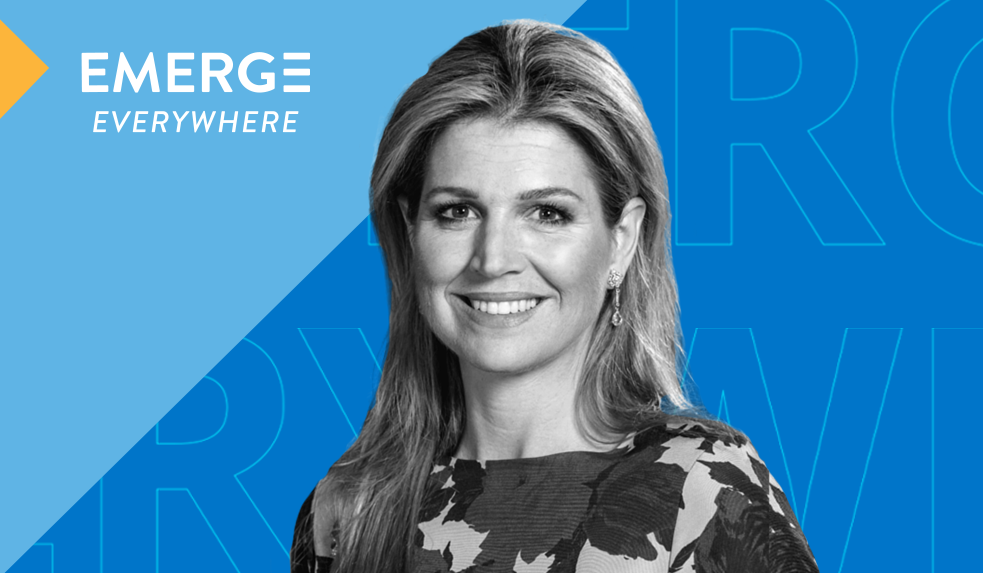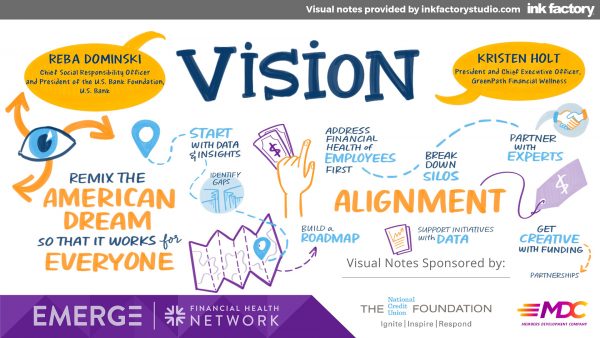Financial Health Solutions: Promoting Employee Financial Health With a Mobile App
When offered digital financial wellness tools, which workers use them most? Explore how various employee groups engaged with a mobile app rolled out by University Federal Credit Union in Austin, Texas.
H.M. Queen Máxima of the Netherlands: Building a Financially Inclusive World
Her Majesty Queen Máxima of the Netherlands’ passion for financial inclusion began as a child in Argentina, navigating the impacts of hyperinflation on families and desire to act. In her role as the United Nations Secretary-General's Special Advocate for Inclusive Finance for Development (UNSGSA), she champions access to affordable and safe financial services for communities around the world, especially underserved groups. Through close collaboration with public and private sector partners, her work has driven real progress for financial health. In this episode of EMERGE Everywhere, learn more about Queen Máxima’s experiences, accomplishments, and vision for the future of financial inclusion and financial health.
EMERGE Workplace 2022
This event will explore the latest trends, strategies, and solutions for employers seeking to improve the financial health of their teams.
Brett King: The Future of Everything
Can we predict the future? Brett King believes he can. The self-proclaimed futurist is known for his ability to see the social and economic changes coming and the opportunities they will bring. In this episode of EMERGE Everywhere, Jennifer sits down with Brett to discuss his newest book, “The Rise of Technosocialism: How Inequality, AI and Climate Will Usher in a New World,” and how we can prepare ourselves to meet the most pressing challenges facing businesses and societies today.
Advancing Equity Through Worker Financial Health: A Framework for Employers
The Financial Health Network began conducting research in early 2021 to identify strategies employers can use to embed an equity lens into their benefits programs. HR leaders can use these early learnings to design and deliver programs and benefits that reduce financial health gaps among employees.
Pursuing Racial Economic Equity Through Purposeful Engagement
How can innovative investments and partnerships drive real economic change for communities in need? Fifth Third Bank recently announced the Accelerating Racial Equality, Equity, and Inclusion initiative, a $2.8 billion commitment to uplift historically marginalized people and communities. Today, in collaboration with Enterprise Community Partners, the bank is investing $180 million of that commitment in nine communities across its geographic footprint through the Neighborhood Investment Program. Hear from a panel of the project’s leaders about strategies to purposefully engage neighborhoods and local businesses, and find out what’s next for this initiative.
The Role of Community Networks for Emergency Savings Success
Join us at this ESI-sponsored Short-Term Savings Small Group meeting to learn more about the direct and indirect role that these support networks can play in emergency savings.
EMERGE Live 2020 Speakers
EMERGE Live gave participants instant access to more than 75 of the biggest names across the marketplace as they shared innovative solutions for advancing financial health.
Vision
Join us to hear how financial industry leaders have secured stakeholder buy-in to build financial health strategies, ensured employees understand and can rally behind a shared finhealth vision, and integrated financial health as part of their organizational culture.
In Their Words: What Older Adults Struggling Financially Need
Despite the recent stimulus, increased vaccinations, and gathering momentum of reopenings across the country, millions are still struggling with their financial health. Ongoing economic uncertainty, job loss, and physical health concerns have caused many to shift financial priorities just to stay afloat. In the Financial Health Network’s latest…
The Future of Financial Wellness is Taking Shape
As the way we work changes, financial wellness should adapt too. Explore these new ideas that are shaping the future. While the initial thrust into remote work was a crisis response, it is now being embraced by both employees and employers. In fact, many companies plan to maintain remote workforces. Presented by Morgan Stanley at Work
The U.S. Financial Health Pulse: A Roadmap for Recovery
As vaccines roll out across the country, the Biden administration is considering bold policies to help struggling households, businesses, and communities recover from the health and economic impacts of the COVID-19 pandemic. For these efforts to be successful, the new administration – along with businesses, employers, and other stakeholders –…
Good Jobs Matter: Improving Job Quality for Low-Income Workers
While employee benefits are clearly important for financial health, they are the job quality dimension rated lowest among low-income workers. In order to improve employee financial health, employers should invest in benefits that support worker financial well-being.
The Fintech Effect: Consumer Impact and the Future of Finance
In this research, Plaid examines how consumers use fintech, how they feel about it, how it impacts their lives, and how all these sentiments vary across demographic groups.
Consumer Financial Data: Legal and Regulatory Landscape
Explore the federal framework governing consumer financial data in the United States and learn the critical questions arising from our changing financial data ecosystem.
It’s the Organizational Siloes, Not Just the IT Stacks, that Are Sidelining Innovation
Since consumers clearly want the personal finance tools developed by fintechs and other innovators, why are banks and credit unions not offering them widely? The core challenge is to get fintech apps to talk with banks’ existing technology stacks and build a shared business case across the organization.
Building Valuable Customer Relationships Through Financial Health
While the vast majority of customers expect their primary financial institutions (PFIs) to help improve their financial health, few believe their PFIs are actually doing it.
Eviction Prevention: Tips for Effective Resident Engagement
Provided by NeighborWorks America, this research examines the most common reasons for loss of rental housing and identifies which resources vulnerable renters need to achieve housing stability.
Balancing Today, Building Tomorrow: How Financially Coping Americans Plan, Save, and Invest
Even before COVID-19, millions of Americans were struggling financially, with more than half the population classified as Financially Coping. As job losses mount, savings are spent down, household debt grows, and investments shrink during the pandemic, Americans need financial support more than ever. This new research sheds light on how providers can support the saving and investing behaviors of Financially Coping consumers, ultimately improving both their immediate and long-term financial health.
Simplifying Savings: Using KPIs to Track Financial Health for Credit Union Members
The Financial Health Network worked with Community First Credit Union to analyze its Save My Change Program, a round-up savings tool, revealing the benefit to member financial health.
Policy Perspective: Supporting Consumers in a Financial Health Crisis
Author: Dan Murphy One striking feature of the Covid-19 economic crisis is just how different it is from our most recent financial crisis. While the subprime mortgage crisis began with an immediate shock to financial markets, the economic crisis brought about by this pandemic began with an immediate shock to public health that quickly impacted…
Member-Exclusive Webinar: Financial Health and COVID-19: New Insights from the U.S. Financial Health Pulse
This Member-exclusive webinar examined new data from the 2020 U.S. Financial Health Pulse and highlighted how Members are helping their customers, employees, and communities weather the crisis.
Webinar: Fintech for the 50+: How to Design for Low-to Moderate-Income Older Adults
Older generations face the greatest health risks from COVID-19 and are also challenged to conduct financial management without access to in-person financial services like banking.
Speaking Out About Racial Discrimination: A Letter To Our Staff
This blog by Jennifer Tescher was shared with the Financial Health Network staff in the wake of the murder of George Floyd at the hands of police and the protests and civil unrest that have followed: Putting emotions into words is hard right now.
Wayne State University Case Study: Giving Students a Second Chance at Success Through Debt Forgiveness
Research from the Financial Health Network shows that removing financial barriers for students can help them succeed both financially and academically. Learn how Wayne State University is working to develop effective tools for student success through the “Warrior Way Back,” a unique debt forgiveness program.
Member-Exclusive Webinar: The Intersection of Consumer Transactional + Survey Data
Discover insights related to the intersection of consumer transactional data and survey data during this first webinar from the U.S. Financial Health Pulse Webinar Series.
Cross-Sector Solutions: A Guide to Nonprofit-Fintech Partnerships
Learn best practices and real-life success stories from the Financial Health Network’s Nonprofit-Fintech Exchange, a marketplace for exploring collaboration and sharing insights on building high-impact partnerships.
Webinar: A Roadmap for Partnerships and Profitability
This webinar recording explores the business case of proven strategies providers can use to build financial health and how implementing these interventions may impact a provider’s profitability and business performance.
A Guide to Measuring Small Business Financial Health
In this guide, we include nine indicators of small business financial health with two measurement methods (survey data or observed data), as well as corresponding survey questions and suggested data points.
Driving College Success
Higher education can provide remarkable access and opportunity to Americans, but financial challenges often prevent students from reaching their full academic potential. Read about how educational institutions can help more students achieve academic success and financial health.
Webinar: Understanding Your Financially Coping and Vulnerable Customers
During this member-exclusive webinar, authors of the U.S. Financial Health Pulse 2018 Baseline Survey explored findings from this groundbreaking research initiative. The second in a three-part series, this conversation shared a deep dive on never-before-released Pulse data representing individuals who are financially Coping or Vulnerable.
Webinar: What Customers Actually Want: Customer Satisfaction and Financial Health
Join the authors of the U.S. Financial Health Pulse 2018 Baseline Survey for the third in a member-exclusive webinar series exploring findings from this groundbreaking research initiative.
Why Join the Financial Health Network’s Financial Health Leaders Program
LendingClub Leaders Spotlight Video
Hear about Lending Club’s journey as a Financial Health Leader from Public Policy Director, Louis Caditz-Peck.
Solving the Cash Crunch
The Financial Health Network uncovers three ways providers can help small businesses access check funds and manage cash flow successfully.
Technology is Making Parking Tickets Obsolete. Are Overdrafts Next?
Frequent debit card use makes it difficult to keep a diligent check register that accounts for pending payments. Behaviorally informed personal finance apps and smart checking account features have already begun to remove some of the uncertainties posed by recurring cash management challenges, just as smart meters have taken much of the gambling out of parking.
2018 Financial Health Leaders Spotlight: Moven
Listen in as we hear Moven share how it’s measuring the financial health of both their employees and the users of their app and what they are learning along the way.
Insurtech for Financial Health
Explore three major insurtech advances that could help more Americans weather financial shocks successfully, as well as potential pitfalls for insurers working to align business incentives with customer needs.
2018 Financial Health Leaders Spotlight: Accion
Listen in as Accion shares findings from a multi-year, mixed-methods study evaluating the impact of mission-based small business lending services and what partnerships and next steps it’s planning as a result.
Leveraging Opportunities to Improve Financial Health
Learn how LendStreet is using new insights into their customers’ financial habits to leverage opportunities for improving financial health.
The Financial Health Network Comment Letter on Proposed Amendments to Rules Concerning Prepaid Accounts
The Financial Health Network submitted this letter in response to the request for comment on the proposed Amendments to Rules Concerning Prepaid Accounts, issued by the Consumer Financial Protection Bureau (CFPB, the Bureau) and published on June 29, 2017. Like the CFPB, we recognize the important role that prepaid products and services can play in the financial health of U.S. consumers and we are committed to promoting high-quality financial products. We believe that financial services can be a force for good in people’s lives and that meeting consumers’ needs responsibly is ultimately good for both the consumer and the provider.
Secured Credit Cards: Rural, Underserved Communities
Americans in rural communities are losing access to locally available, affordable financial services and products.
Member Exclusive: NGO and Non-profit Scan
Consumer Data Sharing Principles: A Brief on the Framework for Industry-Wide Collaboration
Over the last two decades, the emergence of new intermediaries that aggregate data from numerous sources has enabled financial services providers of all kinds to provide consumers with a more complete view of their financial lives. – See more at: http://cfsinnovation.org/research/consumer-data-sharing-principles-a-brief-on-the-framework-for-industry-wide-collaboration/#sthash.oYX1cTQi.dpuf
2016 Prepaid Industry Scorecard
With millions depending on prepaid cards to help manage their financial lives and forthcoming CFPB regulations, it is important to gauge the quality of products in the marketplace and to encourage prepaid card issuers to develop offerings that actively improve consumers’ financial health.
“VITA Credit Builder” by Mission Economic Development Agency
In 2010, Mission Economic Development Agency (MEDA) launched its Volunteer Income Tax Assistance (VITA) Credit Builder program with the primary goal to establish or improve credit for low-income Latino immigrants and help them responsibly manage credit over the long term.
“Borrow Less Tomorrow” by Clarifi
Piggymojo built an online and mobile tool that uses goal visualization, social sharing and mobile technology to help savers turn impulse buys into “impulse saves.”
The Financial Health Network Comment Letter on the CFPB’s Proposed Rules on Prepaid Cards
The Financial Health Network’s letter to the CFPB focuses on four main areas, each framed around what is best to achieve the overall goal of consumer financial protections that support financial health:



































